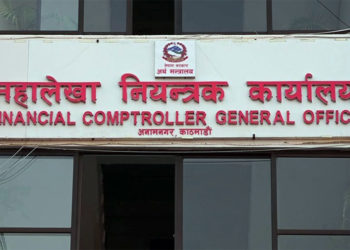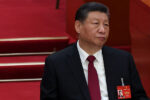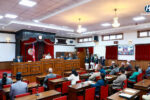KATHMANDU: Economic Digest offers a concise yet comprehensive overview of significant business happenings in Nepal, presented in easily digestible summaries.
The Nepal Rastra Bank (NRB) has reported a stable macroeconomic environment for the first two months of FY 2024/25, noting that inflation has decreased to 3.85% year-on-year, down from 8.19% the previous year, suggesting improved price stability.
Wholesale inflation also fell to 2.75% from 4.78%, while prices for consumption, intermediate, and capital goods rose modestly, although construction material prices declined by 4.22%.
Trade figures reflect concerns as merchandise exports decreased by 5.1%, particularly with significant drops to key partners like India and China.
However, the country’s foreign exchange reserves remain strong at USD 16.04 billion, covering 13.7 months of imports, which supports economic stability.
The NEPSE index demonstrated positive market sentiment, rising to 2,742.88 points.
Meanwhile, commercial banks have revised their interest rates for Kartik, with 10 banks lowering rates, 9 keeping them steady, and Sanima Bank being the only one to increase its rate by 0.25% for individual fixed deposits.
The report from the Nepal Rastra Bank (NRB) has highlighted several key aspects of Nepal’s macroeconomic landscape for the first two months of FY 2024/25, emphasizing stability in inflation, variations in trade, and the status of foreign reserves.
According to NRB, the inflation in Nepal has stabilized at 3.85% year-on-year, a notable decrease from 8.19% in the same period last year.
This decline is significant and suggests improved price stability in the economy. In terms of wholesale prices, there is a similar trend: wholesale inflation stands at 2.75%, down from 4.78% previously.
Consumption goods prices show modest increase
Meanwhile, the prices of consumption goods, intermediate goods, and capital goods have shown modest increases of 1.39%, 3.56%, and 2.77%, respectively.
However, the price of construction materials has decreased by 4.22%, indicating sector-specific challenges.
Merchandise exports decline
The trade balance reflects some concerns, with merchandise exports declining by 5.1%, amounting to Rs. 25.09 billion, according to NRB.
This decline is less severe than last year’s drop of 7.8%, yet it highlights ongoing weaknesses in export performance.
Exports to major trading partners have also decreased: 4.5% to India, a staggering 45.3% to China, and 3.9% to other countries.
While some sectors, such as tea and footwear, have seen growth in exports, traditional products like cardamom and readymade garments have struggled, indicating a shift in demand or competitive disadvantages.
Foreign reserves and economic stability
The country’s gross foreign exchange reserves are robust, standing at USD 16.04 billion, sufficient to cover 13.7 months of imports.
This level of reserves contributes to economic stability and provides a cushion against external shocks, despite the declining export figures.
NEPSE index reflects positive market sentiment
The NEPSE index reflected positive market sentiment, having risen to 2580.76, compared to 1964.92 a year prior.
This increase indicates investor confidence, despite the challenges in trade and inflation.
Overall, while Nepal’s macroeconomic indicators show a stabilization in inflation and strong foreign reserves, the declines in export performance warrant attention for future economic strategies.
Addressing these trade imbalances will be crucial for sustaining economic growth.
Commercial banks adjust interest rates
Commercial banks have announced their updated interest rates for Kartik, which will take effect from the start of the month.
These adjustments show a combination of both decreases and increases across different banks.
Among the 20 banks, 10 have opted to lower their interest rates, nine banks have kept their rates unchanged since Aswin, and one bank has opted for an increase.
Citizens Bank International and Himalayan Bank have implemented the largest reductions, each cutting their rates by 0.75 percent for individual fixed deposits.
In contrast, Sanima Bank is notable for being the only institution to raise its rate, increasing it by 0.25 percent for individual fixed deposits.
For the month of Kartik, Machhapuchhre Bank offers the highest interest rate on individual fixed deposits, while Citizens Bank provides the lowest rate.
NEPSE index climbs to 2,742.88 with 43.22-point gain
The NEPSE index on Wednesday finished the trading day at a remarkable 2,742.88 points, marking a significant increase of 43.22 points or 1.60% from the previous closing value.
Following the Dashain holiday, the market made a strong recovery yesterday, gaining 31.48 points.
The trading session began with the index opening at 2,704.79, hitting an intraday low of 2,704.04 before peaking at 2,748.80.
During this trading period, 320 stocks were traded through 65,845 transactions, resulting in the exchange of 13,224,322 shares and a total turnover of Rs. 5.66 billion.
Market capitalization rose to Rs. 4.36 trillion, with the float market capitalization settling at Rs. 1.54 trillion.
(Prepared by Srija Khanal)









Comment